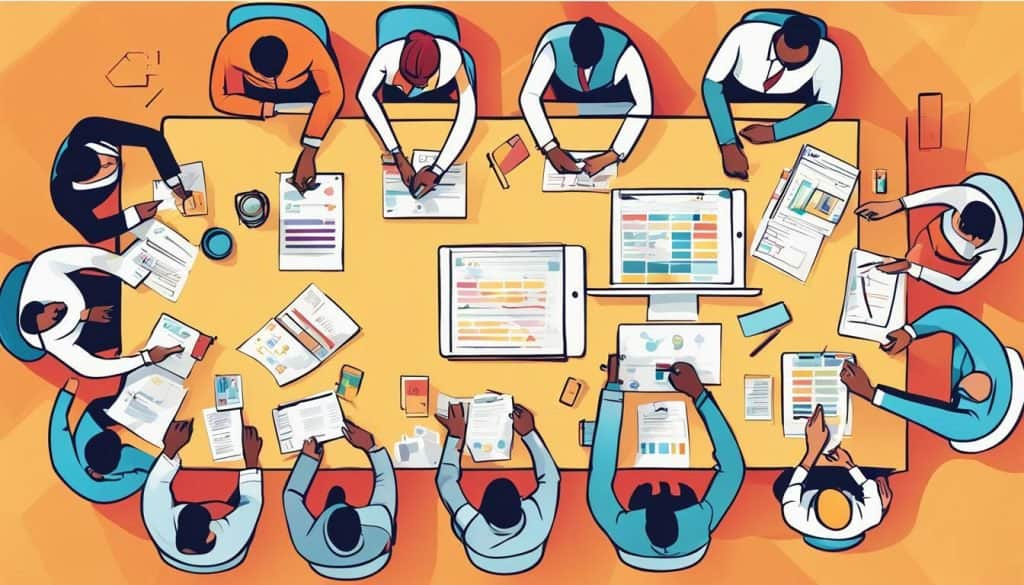Event management can be a complex and challenging field that requires careful planning, coordination, and execution. Whether you’re an experienced event planner or just starting out, it’s essential to have the right skills and knowledge to succeed in this fast-paced industry. In this section, we’ll provide you with expert tips and insights from seasoned professionals on how to succeed in event management.
Key Takeaways
- Effective event management requires a combination of strategic planning and effective execution.
- Key skills include effective communication, organizational skills, budget management, marketing, and logistics.
- Building strong relationships with vendors and partners is crucial for successful event management.
Effective Event Coordination and Organization
The success of an event largely depends on effective coordination and organisation. To ensure seamless execution, meticulous planning is key. Start by selecting a suitable venue, keeping in mind the number of attendees and the logistics involved. Once the venue is locked down, create a detailed event timeline and allocate resources accordingly.
When it comes to logistics, everything from transportation to catering must be taken into account. Determine what equipment you need on hand and what vendors you need to rely on. On the day of the event, make sure all logistics are in place and everything runs smoothly.
In addition to meticulous planning, efficient communication is crucial. All team members should be on the same page, and everyone should know their responsibilities. Use event management software or tools to streamline the planning process and stay organized. Regular team meetings and reports will also help keep everyone up to date.
Strategic Event Marketing and Promotion
Marketing and promotion are vital components of a successful event. To ensure your event reaches its target audience and generates high attendance, you need to develop a strategic marketing plan.
Firstly, identify your target audience and tailor your marketing efforts accordingly. Use social media channels to promote your event and create engaging content that resonates with your audience.
Secondly, create a comprehensive email marketing campaign that includes a series of emails leading up to the event. Offer early bird discounts or exclusive promotions to incentivize people to buy tickets early.
Thirdly, collaborate with industry influencers and relevant organizations to expand your reach. Partnering with sponsors can also help increase your event’s visibility and credibility.
Fourthly, consider using targeted advertising to reach your desired audience. Platforms such as Facebook and Instagram offer highly targeted advertising options, making it easy to reach specific demographics.
Finally, use press releases and media coverage to promote your event. Reach out to local media outlets and offer them exclusive access to your event in exchange for coverage.
By implementing a comprehensive marketing strategy that spans both online and offline channels, you can maximize the impact of your event and ensure maximum attendance.
Efficient Event Logistics and Budgeting
Efficient event logistics and budgeting are crucial to the success of any event. It is important to create a detailed event timeline and allocate appropriate resources for each task. Consider factors such as transportation, equipment, catering, and staffing.
When planning an event, it is important to negotiate contracts with vendors and suppliers to optimize your budget. This may involve comparing multiple quotes, negotiating payment terms, and finding the best value for money.
Throughout the planning process, it is important to closely monitor expenses. Make adjustments where necessary to ensure that the event stays within budget. Unexpected expenses can arise, so it is important to have contingency plans in place.
When it comes to event logistics, creating a detailed plan is essential. This plan should consider factors such as venue selection, scheduling, and vendor management. Effective communication and teamwork are also vital for successful event coordination.
Using event management software or tools can help you to streamline the planning process and stay organized. These tools can help you to ensure that your event runs smoothly and that all tasks are completed on time.
Tips for Efficient Event Logistics and Budgeting
- Create a detailed event timeline and allocate resources accordingly.
- Negotiate contracts with vendors and suppliers to optimize your budget.
- Monitor expenses closely throughout the planning process.
- Make adjustments to your budget and timeline if necessary.
- Use event management software or tools to stay organized and on track.
“Effective budgeting and efficient logistics will ensure that your event is seamless and enjoyable for all attendees.”
Conclusion
In conclusion, succeeding in event management requires a combination of effective coordination, strategic marketing, efficient logistics, and careful budgeting. By following the expert tips provided in this article, you can enhance your event management skills and achieve successful outcomes.
It’s important to remember that event management is a dynamic and fast-paced industry, and it takes dedication, creativity, and attention to detail to excel. Whether you are planning a small corporate event or a large-scale music festival, the key to success lies in staying organized, communicating effectively, and leveraging marketing strategies to maximize the impact of your events.
Ready to plan your next event?
With the skills and knowledge gained from this article, you are well-equipped to plan and execute successful events. Keep in mind that event management requires teamwork, so be sure to collaborate with your team and delegate tasks accordingly. Remember to monitor expenses closely and make adjustments as needed to stay within your budget.
Event management can be a challenging but rewarding field, and with dedication and hard work, you can achieve great success. We hope these tips have been helpful in enhancing your event management skills, and we wish you all the best in your future endeavours.
Thank you for reading, and happy event planning!
What Skills Are Needed to Succeed in Event Management?
Event management is a complex field that requires a range of essential skills. Strong organizational skills are essential to handle multiple tasks efficiently, while excellent communication skills are needed to liaise with clients, suppliers, and team members. Attention to detail is critical for seamless execution, and problem-solving abilities are necessary to handle unexpected challenges. Adaptability and multitasking capabilities are also vital, considering the fast-paced nature of event management and its difficulty in maintaining a successful event.
FAQ
Q: How can I succeed in event management?
A: To succeed in event management, it is important to pay attention to details and ensure smooth coordination and organization of all aspects of the event. This includes venue selection, scheduling, logistics, and vendor management. Effective communication and teamwork are also crucial. Utilizing event management software and tools can help streamline the planning process and stay organized.
Q: What are some tips for effective event coordination and organization?
A: Some tips for effective event coordination and organization include creating a detailed event timeline, allocating resources accordingly, and negotiating contracts with vendors and suppliers to optimize your budget. Additionally, utilizing event management software and tools can help streamline the planning process and stay organized.
Q: How can I strategically market and promote my event?
A: To strategically market and promote your event, it is important to develop a comprehensive marketing plan that includes online and offline promotional activities. Leveraging social media platforms, email marketing, press releases, and partnerships with relevant influencers or organizations can help increase awareness and attendance. Creating engaging content and using targeted advertising can also be effective strategies.
Q: What is important to consider when it comes to event logistics and budgeting?
A: When it comes to event logistics and budgeting, it is important to create a detailed event timeline, allocate resources accordingly, and monitor expenses closely throughout the planning process. Factors such as transportation, equipment, catering, and staffing should be carefully considered. Negotiating contracts with vendors and suppliers can also help optimize your budget and ensure a seamless event experience for attendees.
Q: How can I excel in the field of event management?
A: To excel in the field of event management, it is important to practice effective coordination and organization, strategic marketing and promotion, efficient logistics, and careful budgeting. By following the expert tips provided in this article, staying organized, communicating effectively, and leveraging marketing strategies, you can enhance your event management skills and achieve successful outcomes.




